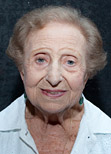MARCH 19, 2008
Fanny Aizenberg discusses life for Belgian Jews after the German invasion in May 1940. Fanny’s husband heeded the call of the Royal Air Force asking for Belgian volunteers while Fanny took care of their young daughter in Belgium.
LISTEN
Esta página también está disponible en español.
TRANSCRIPT
FANNY AIZENBERG:
Well, we were hoping against hope, but the fear was so tremendous because we didn’t know the unknown and we didn’t know what the next day would bring.
NARRATOR:
Over 60 years after the Holocaust, hatred, antisemitism, and genocide still threaten our world. The life stories of Holocaust survivors transcend the decades and remind us of the constant need to be vigilant citizens and to stop injustice, prejudice, and hatred wherever and whenever they occur.
This podcast series presents excerpts of interviews with Holocaust survivors from the United States Holocaust Memorial Museum’s public program First Person: Conversations with Holocaust Survivors.
Here is Fanny Aizenberg talking with host Bill Benson about life in Belgium after the German occupation and her eventual decision to send her daughter into hiding.
BILL BENSON:
On March 21, 1939, you had your child, Josiane. Knowing that Kristallnacht had occurred the previous November, at that time with a newborn baby, do you remember being fearful even at that time? Was it a time of uncertainty and fear for you, or still a time of hope?
FANNY AIZENBERG:
Well, we were hoping against hope, but the fear was so tremendous because we didn’t know the unknown and we didn’t know what the next day would bring. We could not believe that it was possible to have such a persecution of Jewish people which was continuing.
You see, in Belgium they have different clinics (I don’t know if you call that a clinic in America) for a young woman who was to give birth. You have to come every week and the babies were checked by a physician and also if they needed any vaccine, and food was given out to us without [having to] pay.
Once in 1940, when the Germans invaded Belgium, our world fell apart because, like I said before. We were told that Belgium and Holland would remain free countries, you know, like Spain and Switzerland, and of course that didn’t happen; they occupied.
So once the Germans occupied Belgium, the first thing was Jewish people were not allowed to go to those clinics anymore and of course we couldn’t come with the children. The Jewish teachers were not allowed to teach anymore and Jewish physicians were not allowed to practice, to help other people.
When that started, the fear was just unbelievable. I can’t even find the word in English that you could describe the fear of each and every one, constantly, because we didn’t know what the next step. And also, once the Germans occupied Belgium, we all had to report and give our radios to a certain place where you had to give your radio. This way, immediately we were cut off from the news and anything else.
BILL BENSON:
Fanny, that time of course, when Belgium was invaded, was May 1940. Germany and Russia had attacked Poland in 1939. Soon after the invasion and occupation of Belgium, what happened to Jacques? We said earlier that he heeded the call for volunteers. Tell us.
FANNY AIZENBERG:
In 1939, the Belgian government had asked young men to sign up because they too were so fearful and they didn’t know what the next day or whatever is going to happen. To sign up in case there was any danger, that they would be able to help out, not knowing what kind of help. And of course, among thousands of young men in Belgium, my late husband signed up too.
BILL BENSON:
So as far as you knew, you were alone with Josiane.
FANNY AIZENBERG:
That’s correct.
BILL BENSON:
What did you do then?
FANNY AIZENBERG:
Well, since we were told that we were all going to have to go to work, where or why we did not know, in Belgium immediately, the Underground (we called it the Resistance) were trying to find places to hide the Jewish children.
Thanks to the churches and to private families (there’s a movie upstairs on the fifth floor [of the Museum] and I’m sure they’re going to show it more), they show you the people who were kind and willing to risk their lives to help the Jewish children to go into hiding.
I’m sure many people in the audience here could understand how difficult it was. I had a young child and, as prearranged, two ladies came to take her into hiding. I didn’t know them. I was not allowed to know where she was going to be in hiding, because in case we would be arrested and beaten, we probably would give out the names of other people.
My child didn’t want to leave me. She was crying and screaming, but she was in hiding and thank God, she survived, and again, I want to say from the kindness and the generosity. But also you must remember, in Belgium we had rations, and the people who helped us, they do it for no money, nobody got any money, and also they were risking their lives, and that’s how we were living in fear day by day.
NARRATOR:
You have been listening to First Person: Conversations with Holocaust Survivors, a podcast series of the United States Holocaust Memorial Museum. Every Wednesday at 1 p.m. from March through August, Holocaust survivors share their stories during First Person programs held at the Museum in Washington, DC. We would appreciate your feedback on this series. [Please take our First Person podcast survey (external link) and let us know what you think.]
[On] our website you can also learn more about the Museum’s survivors, listen to the complete recordings of their conversations, and listen to the Museum podcasts Voices on Antisemitism and Voices on Genocide Prevention.


